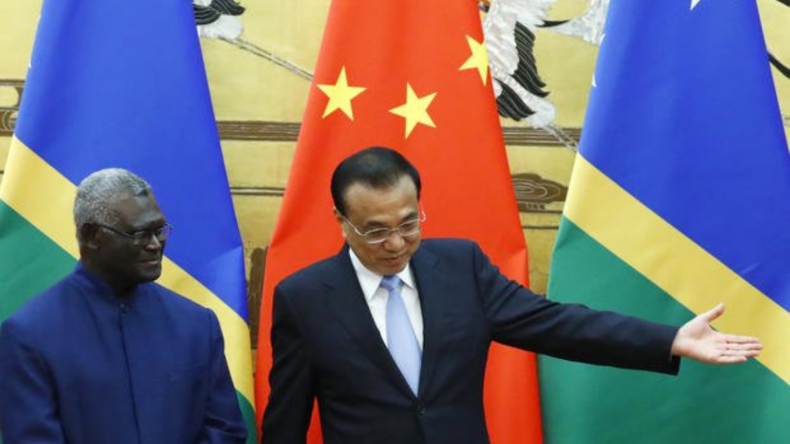The People’s Republic of China signed a broad security deal with the Solomon Islands on Tuesday, an accord that Western nations fear may give China a military footing in the South Pacific.
“Foreign ministers from China and the Solomon Islands recently inked a framework agreement on security cooperation,”
Chinese spokesperson Wang Wenbin said.
Last month, a draft version of the deal surfaced, sending shockwaves around the region due to terms permitting Chinese security and naval deployments to the crisis-hit island nation. As part of these measures, armed Chinese police may be deployed, and Chinese naval warships may be allowed to dock. According to reports, the agreement also includes ‘legal and judicial immunity for Chinese soldiers.
The assurances of Solomon Islands Prime Minister Manasseh Sogavare that he does not plan to enable China to develop a military facility there has done nothing to relieve US fears, which regard the treaty as a “concerning precedent for the larger Pacific Island area.” Australia and New Zealand have also expressed concern.
The Solomon Islands are a group of hundreds of tiny islands in the Pacific Ocean’s southern hemisphere. It is around 2,000 kilometers northeast of Australia. There are six major islands, the biggest of which, Guadalcanal, is home to the capital, Honiara. New Georgia, Santa Isabel, Choiseul, Malaita, and San Cristobal are the others.
The population is over 800,000 people, with more than a quarter living in Guadalcanal or Malaita. There are a few thousand persons of Chinese ancestry. There are also at least 900 smaller islands. The Solomon Islands are nearly 9,000 kilometers away from India.
IS THE CHINA-SOLOMON ISLANDS AGREEMENT AFFECTING INDIA?
No! Not directly or immediately. The islands are a long way from India’s mainland and even the Andaman and Nicobar Islands. China’s advancements in the area, on the other hand, would raise alarm in India.
WHY IS CHINA’S SECURITY AGREEMENT RAISING AN ISSUE?
To begin, it is wise to note that the islands were a significant World War II battleground and that it only recognized China in 2019 after severing ties with Taiwan.
There were unproven rumors at the time that a ‘gift’ of $500 million was involved, as well as payments to Solomon Island MPs in order for them to vote in favour. The transition was heavily debated, with Malaita strongly opposing it, resulting in some violence.
Protesters attempted to assault parliament in November and went on a three-day rampage, torching parts of the capital’s Chinatown quarter. According to reports, the targeting of Chinese
citizens may have triggered Beijing’s participation. The agreement is being viewed as a significant shift in local geopolitics since it grants China direct access to the South Pacific, including Australia and New Zealand.
Among the main fears is that China would establish a military post in the Solomon Islands; in August last year, the island nation’s opposition leader warned that China was attempting to do just that.
According to the Center for Strategic and International Studies in the United States, concerns include not just the ‘placement of police, armed police, military forces…’ but also the ambiguous rhetoric.
The Solomon Islands are strategically important, as seen by their role as a barrier for Australia against the approaching Japanese during WW-II.
There are also concerns that it may slip into Beijing’s debt trap, despite Chinese corporations’ promises to invest billions in mega-infrastructure projects. According to the Guardian, China already consumes more than 90% (by weight) of its extractive resources.
Published By: Bhavya Dedhia













